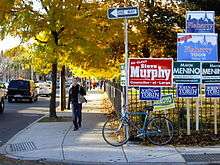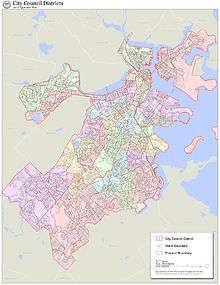Boston City Council

The Boston City Council is the legislative branch of government for the city of Boston. It is made up of 13 members: 9 district representatives and 4 at-large members. Councillors are elected to two-year terms and there is no limit on the number of terms an individual can serve. Boston uses a strong-mayor form of government in which the city council acts as a check against the power of the executive branch, the mayor. The Council is responsible for approving the city budget; monitoring, creating, and abolishing city agencies; making land use decisions; and approving, amending, or rejecting other legislative proposals.

The leader of the City Council is the president and is elected each year by the Council. A majority vote (7–6) is necessary to elect a councilor to president. When the mayor travels out of state or is removed from office, the City Council president serves as acting mayor. The president leads Council meetings and appoints councillors to committees.
Districts and current council


| District[1][2] | Area[3] | Councillor[4] | In office since |
|---|---|---|---|
| District 1 | Charlestown, East Boston, North End | Salvatore LaMattina | 2006 (January) |
| District 2 | Downtown, South Boston, South End | Bill Linehan | 2007 (May) |
| District 3 | Dorchester | Frank Baker | 2012 (January) |
| District 4 | Mattapan, Dorchester | Andrea Campbell | 2016 (January) |
| District 5 | Hyde Park, Roslindale | Timothy McCarthy | 2014 (January) |
| District 6 | Jamaica Plain, West Roxbury | Matt O'Malley | 2010 (November) |
| District 7 | Roxbury | Tito Jackson | 2011 (March) |
| District 8 | Back Bay, Beacon Hill, Fenway–Kenmore, Mission Hill, West End | Josh Zakim | 2014 (January) |
| District 9 | Allston, Brighton | Mark Ciommo | 2008 (January) |
| (At-large) | Michael F. Flaherty | 2014 (January) | |
| (At-large) | Annissa Essaibi George | 2016 (January) | |
| (At-large) | Ayanna Pressley | 2010 (January) | |
| (At-large) | Michelle Wu (President) | 2014 (January) | |
By law Boston municipal elections are nonpartisan in that candidates do not represent a specific political party. However, most city councillors have been members of the Democratic party. John W. Sears was the first Republican elected to the Council, in 1980.[5] Chuck Turner, previous Councilman for District 7, was a member of the Green-Rainbow Party.
Committees
The City Council currently has the following committees:
|
|
Salary
City Councillors are currently paid an annual salary of $99,500. The salary for councillors is half of the mayor's salary, currently $199,500.[6] Every four years, the Council votes on whether or not to raise the mayor's salary, thereby also raising its own salary or not.
City Council salaries since 1980:
- 1980: $20,000[7]
- 1981–86: $32,500[8][9]
- 1987–94: $45,000[9][10]
- 1995–98: $54,500[11]
- 1999–2002: $62,500[12]
- 2003–06: $75,000[13][14]
- 2006-15: $87,500[6]
- 2016–present: $99,500[6]
History
Prior to 1909, Boston's legislative body consisted of an eight-member Board of Aldermen and a Common Council made up of three representatives from each of the 25 wards in the city. When the Boston city charter was rewritten in 1909, the Board of Aldermen and the Common Council were replaced by a nine-member City Council.[15] All nine councillors were elected at-large for terms lasting two years. The new charter also gave the Mayor the power to veto all acts of the City Council. The first council meeting as a unicameral body occurred on February 7, 1910.[16]
The procedure for electing city councillors was changed by Chapter 479 of the Acts of 1924, which provided for the election of 22 city councillors, one from each ward, beginning with the biennial election in 1925. The procedure was changed again by Chapter 356 of the Acts of 1951, which provided for the election of nine city councillors, all at large, for two-year terms.[17]
In November 1981, Boston voters approved again changing the composition of the Council, to 13 members: 9 district representatives and 4 at-large members. However, the referendum did not indicate how the district lines would be drawn, only that the districts be of approximately equal population[18] and district lines not cut across city precincts.
The Council created a districting committee to propose several different possible district maps and hold public hearings before presenting one plan to the Council to approve.[18] State law required the City Council to make a final decision on the districts within 90 days of being notified that the referendum had officially passed, meaning that the Council voting on the districts would be the 1982 Council, not the 1981 Council creating them.[18] Then-president Patrick McDonough, who opposed district representation, appointed Rosemary Sansone, a major advocate of district representation, as chair of the districting committee, but chose Frederick C. Langone, Dapper O'Neil, and John W. Sears as the other three members, all of whom opposed district representation.[19] Both Langone and O'Neil would be returning to the Council in 1982, but Sansone did not run for re-election in 1981 and would not be able to vote on the district boundaries if the committee did not work quickly to present a plan to the Council before the end of the year.[18] Public hearings over possible district boundaries were full of heated debate between advocates of drawing lines to protect neighborhood unity and advocates of drawing lines to create two predominantly minority districts and give minorities a voice in local government.[20] Contention centered around Dorchester and the South End. Dorchester, Boston's largest neighborhood, needed to be split into at least two districts.[21] A simple split in half would create either a north and a south district or an east and a west district.[21] An east district would be largely White (75% or greater) and a west district would be largely African-American. North and south districts would have less extreme majorities. Many residents were opposed to both divisions, stating that they would increase racial segregation in Dorchester and continue the political powerlessness of minorities.[21] A more complicated split taking into account areas with large minority populations would create one predominantly minority district and one predominantly white district but treat Dorchester as several smaller neighborhoods to be divvied up among surrounding neighborhoods rather than as one community.[21] In various proposals, the South End, due to its location, was grouped with either South Boston or Back Bay/Beacon Hill by advocates of neighborhood unity, or Roxbury by advocates of minority-dominated districts.[19]
Two days before the 90-day deadline, freshman councilor Terrence McDermott, who had been appointed as Sansone's replacement for chair of the districting committee, presented a plan to the Council which was approved 7-2.[22] Today's district boundaries are only slightly different than those adopted in 1982, with the South End and South Boston forming one district, and Dorchester roughly split into an east and a west district. The Council faced more challenges after finalizing the new districts, such as whether or not district councillors should receive a lower salary than at-large councillors[23] and where office space for four additional councillors could be found in City Hall.
Presidents
|
|
|
See also
- Past Members of the Boston City Council
- Boston City Hall, home of Boston City Council (1969–present)
- Old City Hall (Boston), School Street, former home of the City Council (1865–1968)
- Boston Board of Selectmen (ca.1630s–1822), predecessor to City Council
Public records of Boston City Council
- City Departments' Annual Reports
- Complete stenographic machine record of the public meeting of Boston City Council
- Full text of Captions from Webcasts/Cablecasts of Boston City Council
- Publications of Boston City Council
- Communications of Boston City Council distributed by email
- Communications of Council Committees
Notes
References
- ↑ "Electoral Maps". Boston Redevelopment Authority. Retrieved October 2014. Check date values in:
|access-date=(help) - ↑ "City Council District Map". City of Boston. Retrieved October 2014. Check date values in:
|access-date=(help) - ↑ "2012 Guide to Elected Officials and City Services of Boston". League of Women Voters Boston. Retrieved 17 February 2013.
- ↑ "Boston City Council Members". City of Boston. Retrieved 17 February 2013.
- ↑ "Short Circuits". Boston Globe. January 27, 1980. p. 1. Retrieved March 8, 2009.
- 1 2 3 "Boston City Councilors OK 14 Percent Pay Raise For Themselves". www.wbur.org. Retrieved 2016-10-17.
- ↑ Richard, Ray (January 8, 1980). "Iannella new president of Boston City Council". Boston Globe. p. 1. Retrieved February 20, 2009.
- ↑ Langner, Paul (September 28, 1980). "White to approve his pay hike". Boston Globe. p. 1. Retrieved March 1, 2009.
- 1 2 Rezendes, Michael (January 29, 1992). "Raises will be asked for council". Boston Globe. p. 22. Retrieved February 22, 2009.
- ↑ Jordan, Robert A. (December 27, 1986). "Unfinished '87 business". Boston Globe. p. 25. Retrieved March 1, 2009.
- ↑ Aucoin, Don (December 22, 1994). "City councilors get a pay raise; Little public outcry heard as officials vote themselves 21 percent increase". Boston Globe. p. 30. Retrieved March 1, 2009.
- ↑ Schweitzer, Sarah (January 31, 2002). "Ross named to key post as council eyes pay issues". Boston Globe. pp. B.2. Retrieved February 22, 2009.
- ↑ "The rewards of public service". Boston Globe. June 29, 2003. p. 11. Retrieved March 1, 2009.
- ↑ Walker, Adrian (February 20, 2006). "What worth councilors?". Boston Globe. pp. B.1. Retrieved February 22, 2009.
- ↑ O'Connor, T.H. (1997). Boston Irish: A Political History. New York: Back Bay Books.
- ↑ "Boston City Council 1910–2009: Selected Accomplishments" (PDF): 4. Retrieved March 31, 2011.
- ↑ "Archives Guide ~ City Council". Retrieved April 27, 2015.
- 1 2 3 4 Radin, Charles A. (November 12, 1981). "Sansone asks neighborhood input on Hub voting-district lines". Boston Globe. p. 1. Retrieved March 1, 2009.
- 1 2 Radin, Charles A. (December 9, 1981). "Boston district debate begins with sparring over South End". Boston Globe. p. 1. Retrieved March 1, 2009.
- ↑ Ashbrook, Tom (December 15, 1981). "Dorchester speakers spar over districting proposals". Boston Globe. p. 1. Retrieved March 1, 2009.
- 1 2 3 4 Radin, Charles A. (January 24, 1982). "Districts – A clash of plans". Boston Globe. p. 1. Retrieved March 1, 2009.
- ↑ Powers, John (March 7, 1982). "Neighborhood boy remaps city; Terry McDermott solved a political Rubik's Cube". Boston Globe. p. 1. Retrieved March 1, 2009.
- ↑ Jordan, Robert A. (March 4, 1982). "Issue for Hub council: What to pay district councilmen". Boston Globe. p. 1. Retrieved March 1, 2009.
- ↑ Marquard, Bryan (December 20, 2007). "'Dapper' O'Neil, champion of personal politics, dies at 87". Boston Globe. Retrieved May 31, 2012.
Further reading
- "Councilors insist their far-flung trips benefit the city", Boston Globe, October 24, 2015
External links
| Wikimedia Commons has media related to Boston City Council. |
- City Council – City of Boston
- YouTube
- Google news archive
- An Open Boston City Council
- Boston Public Library. City Council Debates. Transcripts of debates from 1955–1962.

